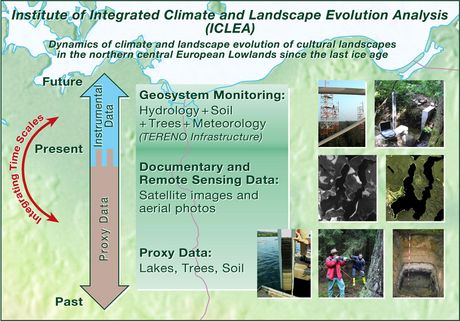
Concept
In the Virtual Institute ICLEA (Integrated Climate and Landscape Analyses) we apply a novel concept of bridging time scales (Figure) based on a two-step approach including:
- significantly increasing the time resolution and the precision of dating of proxy data by integrating natural archives with seasonal time resolution, and,
- calibrating and verifying these proxy data by extensive on-site instrumental monitoring.
This unprecedented high temporal resolution data set will allow us to investigate specifically how fast or sudden landscape scale changes occurred in the past, along with their driving forces and possible threshold processes/tipping points - essential knowledge for estimating the extent and impact of future changes.
The northern central European lowlands in Germany and Poland provide an ideal 'large scale natural laboratory' for this purpose because the landscape formation is young in geological terms allowing us to trace landscape evolution from point 'zero' after the glacier retreats at the end of the last ice age. Moreover, this area is characterized by rather low annual precipitation and thus is particularly vulnerable to hydrological changes. Declining lake levels in this region during the last three decades are of great concern. Definite explanations for this phenomenon are still lacking. Solving this problem and providing profound data for regional water management strategies is one of the tangible tasks of ICLEA.
Schematic description of the overall research concept of integrating data sources at various time scales, utilizing large-scale research infrastructure of the TERENO (TERrestrial ENvironmental Observatories) long-term monitoring program of the Helmholtz Association.
The ideal large-scale research infrastructure for the ambitious aims of ICLEA is provided by the recently established north-eastern German lowland observatory, the fourth observatory within the TERENO (TERrestrial ENvironmental Observatories) long-term monitoring program of the Helmholtz Association.
ICLEA - A Virtual Institute within the Helmholtz Association

